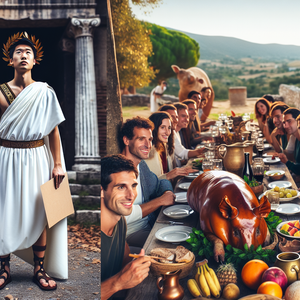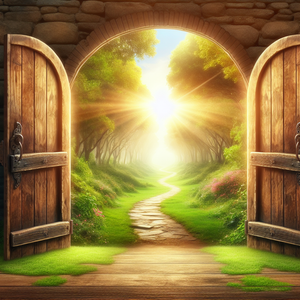Gladiators and Gold: The Financial Impact of Entertainment in Ancient Rome

Gladiatorial games were elaborate events that attracted massive crowds, providing a substantial source of revenue for the Roman economy. Ticket sales, which could be quite costly, contributed to the financial pool, while sponsorships from wealthy patrons added another layer of income. These events were often funded by political leaders aiming to gain favor with the populace, creating a cycle where entertainment served both economic and political purposes. For instance, emperors such as Trajan and Augustus understood that hosting grand games was an effective way to showcase their power and generosity. The Colosseum, one of the most iconic symbols of Rome, could hold tens of thousands of spectators, each contributing to the economic ecosystem surrounding the games. Vendors sold food, drinks, and merchandise, further enhancing the economic impact of these spectacles. According to historical records, during the games held by Trajan, the emperor reportedly distributed 10,000 sesterces worth of money and prizes to the victors, thus reinforcing the financial significance of these events. Additionally, the games stimulated ancillary industries, including those producing weapons, armor, and theatrical props. The economic ripple effect extended to artisans, merchants, and laborers who thrived on the influx of visitors during these spectacles, showcasing the multifaceted financial impact of gladiatorial games on Roman society.
Political Influence and Public Sentiment
Beyond revenue generation, gladiatorial games played a pivotal role in shaping public perception and political landscapes. The phrase "bread and circuses" (panem et circenses) encapsulated the Roman strategy of appeasing the masses through food and entertainment. By providing these spectacles, leaders could distract the populace from political issues, social inequities, or military failures. The games often served as a platform for political propaganda. Emperors and politicians would use the events to showcase their wealth, power, and benevolence, often portraying themselves as protectors of the Roman people. This manipulation of public sentiment was crucial, especially during times of unrest or dissatisfaction with the ruling class. A well-timed gladiatorial event could shift public attention and mitigate dissent. For example, during the tumultuous reign of Nero, extravagant games were organized to placate an increasingly restless populace, demonstrating how entertainment was wielded as a political tool. Moreover, the outcome of these games could influence political fortunes. Victorious gladiators could garner public favor, posing a potential threat to the political elite, while the emperors could consolidate their power by controlling the narrative surrounding these events.
The Social Hierarchy and the Gladiatorial Spectacle
Gladiatorial games also reflected and reinforced the social hierarchies of Roman society. The participants, often slaves or prisoners of war, were thrust into the brutal arena, embodying the empire's complex relationship with power, privilege, and violence. While gladiators could achieve fame and even wealth, their status was paradoxical; they were both celebrated and marginalized, illustrating the intricate social dynamics of the time. Moreover, the games attracted a diverse audience that included senators, equestrians, and common citizens, creating a rare space where social classes mingled. This mingling was significant in a society marked by rigid class structures, as it allowed for a brief suspension of social norms, albeit within the confines of violence and spectacle. The gladiatorial arena was a stage where social barriers were temporarily lowered, allowing for a shared experience of excitement, fear, and camaraderie among spectators from all walks of life. The popularity of certain gladiators transcended their status as mere entertainers, as they could become symbols of resilience and strength. This phenomenon is illustrated by figures like Spartacus, whose legacy as a gladiator-turned-rebel highlighted the complexities of social class and the struggle for freedom in a deeply stratified society.
The financial impact of gladiatorial games in ancient Rome extends beyond mere entertainment; they were a crucial component of the empire's economy, a tool for political maneuvering, and a reflection of societal values and hierarchies. By examining these spectacles, we gain insight into the complexities of Roman life, where entertainment served as both an economic engine and a means of social control. Gladiators and their games were more than just blood sports; they were a vital thread in the fabric of Roman society, intertwining wealth, power, and the human experience in ways that resonate even today. Understanding the intricate relationship between gladiators, gold, and the socio-political landscape of ancient Rome allows us to appreciate the profound impact of entertainment on civilization, both in antiquity and in modern times.
Cultural Heritage Project Manager
Museums, cultural institutions, and non-profit organizations
Job Description
Oversee the planning and execution of projects aimed at preserving and promoting cultural heritage, including ancient history and entertainment studies.
Collaborate with historians, archaeologists, and local communities to develop educational programs and exhibits that highlight the significance of cultural artifacts and events.
Required Skills
Project management experience
Strong communication and organizational skills
Background in history or cultural studies
Historical Consultant for Film and Television
Film studios, television networks, and production companies
Job Description
Provide expertise on ancient Rome’s culture, societal norms, and entertainment practices to ensure accuracy in film and television productions.
Collaborate with writers and directors to develop scripts and storylines that authentically reflect historical contexts and characters.
Required Skills
In-depth knowledge of ancient Roman history
Scriptwriting experience
Strong analytical skills
Museum Curator – Ancient Rome Exhibits
History museums, cultural heritage sites, and educational institutions
Job Description
Curate exhibitions focused on ancient Roman entertainment, including gladiatorial games, to educate the public about their historical significance.
Research, collect, and preserve artifacts, while also developing engaging narratives that connect visitors with the past.
Required Skills
Expertise in archaeology or history
Experience in exhibit design
Strong public speaking abilities
Academic Researcher in Ancient Studies
Universities, research institutions, and think tanks
Job Description
Conduct research on the economic, political, and social implications of entertainment in ancient civilizations, focusing on case studies like Roman gladiatorial games.
Publish findings in academic journals and present at conferences to contribute to ongoing scholarly discourse in the field.
Required Skills
Advanced degree in history or archaeology
Strong research and writing skills
Familiarity with academic publishing processes
Event Coordinator for Historical Reenactments
Historical societies, educational organizations, and tourism companies
Job Description
Plan and execute historical reenactments of gladiatorial games or other ancient Roman events, ensuring authenticity and educational value for participants and spectators.
Liaise with historians, performers, and sponsors to create immersive experiences that bring ancient history to life.
Required Skills
Strong organizational and logistical planning abilities
Knowledge of historical events
Experience in event management


